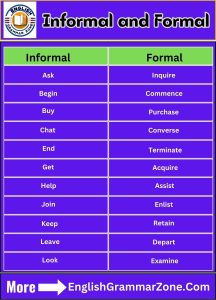Discover 46 informal and formal words in English to enhance your communication skills. Learn when to use casual language and how to switch to formal expressions for professional or academic settings.
Certainly! Here’s a table with two columns: Informal and Formal.
| Informal | Formal |
| Ask | Inquire |
| Begin | Commence |
| Buy | Purchase |
| Chat | Converse |
| End | Terminate |
| Get | Acquire |
| Help | Assist |
| Join | Enlist |
| Keep | Retain |
| Leave | Depart |
| Look | Examine |
| Make | Create |
| Need | Require |
| Pay | Remit |
| Put off | Postpone |
| Quit | Resign |
| Reply | Respond |
| Say | Express |
| Show | Demonstrate |
| Start | Initiate |
| Stop | Cease |
| Tell | Inform |
| Think | Contemplate |
| Understand | Comprehend |
| Use | Utilize |
| Wait | Anticipate |
| Want | Desire |
| Watch | Observe |
| Work | Labor |
| Appear | Seem |
| Connect | Associate |
| Discover | Uncover |
| Eat | Consume |
| Find | Locate |
| Go | Depart |
| Have | Possess |
| Ignore | Disregard |
| Keep | Preserve |
| Like | Prefer |
| Move | Relocate |
| Permit | Allow |
| Question | Interrogate |
| Receive | Obtain |
| Search | Investigate |
| Start | Embark |
| Try | Attempt |
| Use | Employ |
| Visit | Attend |

Here are some additional tips for46 Informal and Formal words in English:
1. Know Your Audience: Always consider who you’re speaking or writing to. Use formal language in professional settings, like business emails or academic papers, and informal language when communicating with friends or in casual environments.
2. Context Matters: The situation or context often dictates the level of formality. For instance, you might use informal words with colleagues during lunch but switch to formal language in a meeting.
3. Practice Code-Switching: Being able to switch between formal and informal language depending on the situation is a valuable skill. Practice this by writing or speaking in both styles to get comfortable with transitions.
4. Use Synonyms for Variety: If you’re frequently communicating in formal settings, using a range of synonyms can prevent repetition and enhance clarity. For example, instead of always using “begin,” you could use “commence” in formal writing.
5. Pay Attention to Tone: Even within informal and formal categories, words carry different tones. Some informal words might seem overly casual or even rude, while certain formal words might sound too stiff. Adjust your word choices to match the tone you want to convey.
6. Stay Current with Trends: Informal language can change rapidly, especially with internet slang or popular culture. Staying updated helps you avoid outdated or awkward expressions in casual conversation.
7. Avoid Over-Formalizing: In some cases, using overly formal language might come across as pretentious or alienate your audience. Strike a balance between professionalism and readability, especially when writing.
8. Use Formality for Politeness: When in doubt, leaning towards formal language can show respect and politeness, particularly in uncertain or unfamiliar situations.
By mastering the appropriate use of formal and informal language, you can enhance both your written and spoken communication, ensuring it resonates well with any audience.